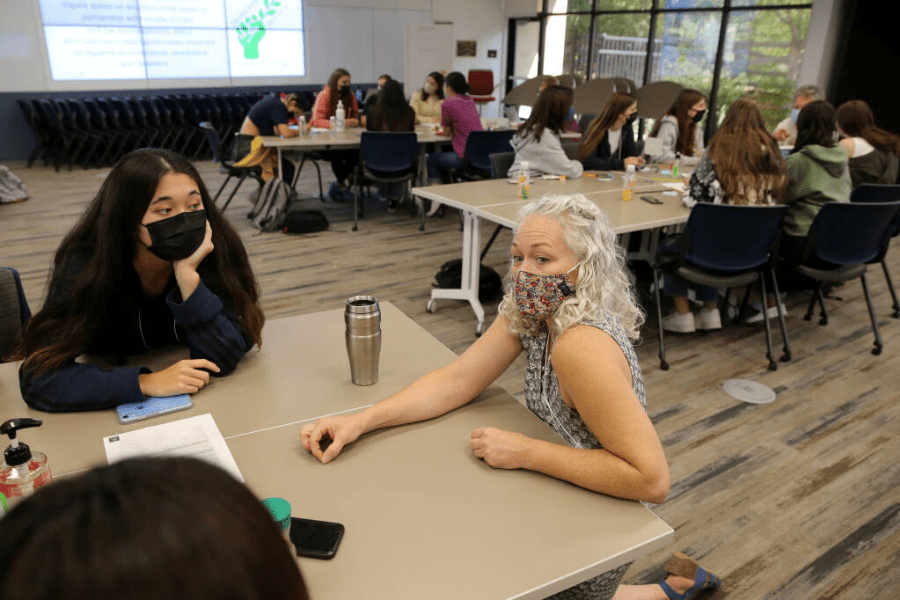ALANA MINKLER
THE PRESS DEMOCRAT
October 1, 2021, 6:45AM
View Original Article Here
Sonoma County has nearly five dozen youth leaders who’ve embarked on a quest to find solutions to climate change.
The 58 middle and high school students from nine schools have begun a series of yearlong projects aimed at recognizing challenges and offering solutions to vexing environmental problems in their communities.
Their hands-on projects aim to research and address environmental justice issues including pesticide use, waste management and water quality affecting disadvantaged populations.
“What we do now will affect our world later,” said Avi Czapszys, 11, a sixth grader at Willowside Middle School in east Santa Rosa. “Not just us though, but future generations also.”
The students kicked off their efforts at the Sonoma County Office of Education last Thursday for a launch event that included a Q&A with Rep. Jared Huffman, D-San Rafael, who cheered on work to mint the next generation of climate leaders.
With their commitment, he said, “I’m pretty hopeful that we can blast through these obstacles and make the changes that we need.”
Next comes work in teams where the students will tackle their topics with help from teachers and subject matter experts. The collaboration is meant to build job skills and pair students with community leaders and scientists to form lasting mentorships.
Near the end of the school year, on April 22, which is also Earth Day, each team will present their project to the public. The county office will offer grants of up to $1,000 for teams that want to continue their efforts. Participants will be eligible for the State Seal of Civic Engagement and will also earn an Environmental Scholars Certificate.
The students are part of the SCOE’s newly formed Environmental Justice Coalition, supported by a budget of $50,000 drawn from leftover revenue from events and donations.
The program’s launch comes as the world endures mounting environmental crises including intensifying wildfires, deadly floods and historic droughts.
The program was devised to support a generation that stands to bear the brunt of those impacts over their lifetime — by giving them early training on how to respond and cope with the staggering problems set in motion long before they were born.
“They understand that as a society, we don’t have the luxury of time,” said Kelly Matteri a curriculum coordinator at SCOE. “As adults, it’s vital that we acknowledge and honor all of the skills, insight and dedication of this generation and provide them the opportunity to put those skills to work.”
Hope for change
Ava Hamelburg, 17, a senior at Windsor High School, was already passionate about the intersection between environmental issues and social justice, so when she heard about the coalition through her school, she immediately signed up. Her group plans to study the community health impacts of pesticide and fertilizer use in vineyards.
“There’s no point in saving society if there’s no planet to live on, and there’s no point in living on the planet if society is in shambles,” Hamelburg said.
She said her generation is acutely aware of the fallout of climate change and the existential threat to the planet.
That can be scary but, “we realize that the best chance we have at a future is by taking those steps now,” Hamelburg said.
Her biggest take-away from the kick-off event was the speakers’ focus on students’ ability to get involved in environmental justice on the local level.
“It was really reassuring,” she said, especially when “we have such high ambitions on how to save the world.”
Alison Stephens, 15, a freshman at Cloverdale High School, said the initiative made her feel hopeful for the future and she’s excited to work on a project that would bring recycling back to the school and back to the community.
The participating students said they felt the weight of older generations’ expectations that they fix climate change, and that it put a lot of pressure on them.
But they also said that faith in them was empowering.
“I took with me a feeling of determination to keep on continuing along the path and now I know what goal we’re going to aim to,” Czapszys said.
Ambitious projects
The students have devised projects that envision better campus recycling systems, easier access to waste disposal for homeless residents and promoting Indigenous voices in the fight against climate change.
“They are so motivated, I cannot even tell you,” said Annette Dobler, a teacher at Willowside Middle School.
A group of sixth-grade students from Willowside plans to conduct research on pesticide use in local agriculture and the impact on children’s health. They’ll be taking a closer look at water supply to their campus and the nearby town of Graton, said Russell Wettle, 11, a sixth-grader at Willowside.
“It is so exciting and invigorating for them to feel they can actually do something,” Dobler said.
She highlighted the dedication of one sixth-grade student, Czapszys, who has been a leader among his peers in environmental activism, creating a school club. When she heard about SCOE’s new initiative, she asked Czapszys if he could gather a group of his classmates to participate. He jumped at the chance.
“She saw my passion,” he said. “I was really excited.”
The students came up with their project ideas after listening to panelists Olivia Ryder, an atmospheric scientist at Sonoma Technology, an environmental consulting firm, and Nichole Warwick, leadership institute programs manager at Daily Acts, a Petaluma-based nonprofit organization.
Warwick talked about how she dedicated herself to environmental health and safety in the North Bay Area after surviving breast cancer in 2012. She’s campaigned against the use of harmful pesticides on local school properties.
“What was most impactful for me at that experience was walking into that space with 50 young people who care about our environment and want to see greater justice,” Warwick said. “I felt extraordinarily inspired when I was listening to the issues they care about.”
Questioning a congressman
As part of the county’s effort to give youth a seat at the table in talks about climate change, students were given the opportunity to ask Congressman Huffman questions about environmental policies.
Huffman sat in front of the class on a Zoom call projected on the walls of the conference room and was peppered by students’ questions.
They asked about wildfire prevention, promoting a green economy, his opposition to a proposed coal train through the region and infrastructure projects that would help combat climate change.
Quinn Shioda, 16, a senior at Technology High School in Rohnert Park asked: “In attempting to rectify the effects of the California wildfires, what type of legislation do you believe would be most effective?”
Huffman acknowledged the significant implications for Northern California, which has endured “five really bad fire seasons in a row,” resulting in poor air quality, mass evacuations, thousands of destroyed homes and more than 150 lives lost.
Huffman said he and other lawmakers were working to bolster the nation’s year-round firefighting force and enable more off-season work to safeguard landscapes from catastrophic fire.
“He answered my question so well and super in-depth,” Shioda said. “I was so grateful.”
An added bonus, she confessed: Asking a congressman a serious question made Shioda feel “kinda cool,” she said.
Lexie Patron, 11, from Willowside Middle School, said she joined the initiative passionate about climate change but left the gathering last week with the realization that teamwork is most important.
“In order to make our hopes and wishes come true, everybody as a whole needs to come together and do their job,” she said.
You can reach Staff Writer Alana Minkler at 707-526-8511 or [email protected]. On Twitter @alana_minkler.


